Sunday Feb 15, 2026
Sunday Feb 15, 2026
Tuesday, 22 December 2020 01:40 - - {{hitsCtrl.values.hits}}
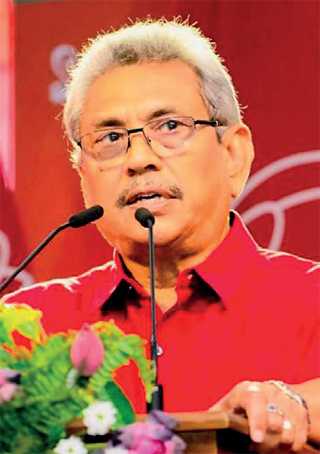
If Ranil Wickremesinghe or even Karu Jayasuriya had been the UNP’s presidential candidate in November 2019, Gotabaya Rajapaksa would have hit his expected 60% mark
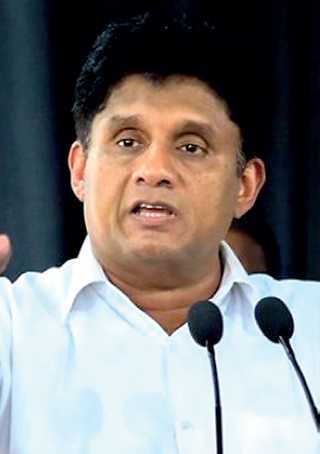
Sajith Premadasa stopped it, holding the line at a respectable 42% at the worst of times for the UNP, and limiting GR to 52% at the best of times for him
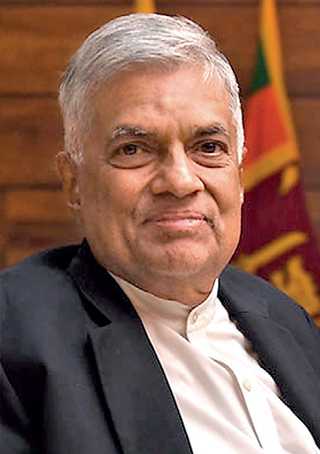
Beyond the political decimation, the utter moral-ethical bankruptcy of the UNP is best evidenced by the fact that Ranil Wickremesinghe remains the Party Leader
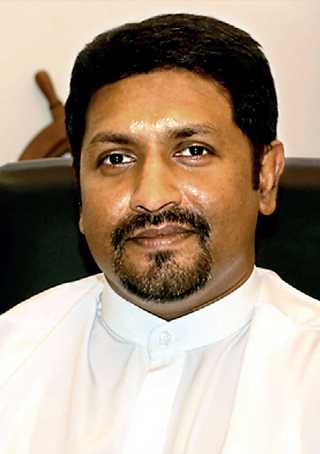
The sleepwalking survivors don’t have the sanity to replace Ranil with Ruwan Wijewardene and nominate the latter for the National List seat
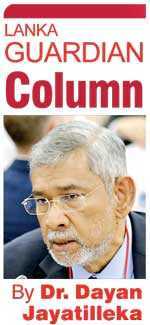 A Cold War, entirely one-sided, has commenced in the Government with Prime Minister Mahinda Rajapaksa’s political guidance and initiative being challenged on a key issue, by the ultranationalist Far Right. Whether the PM chooses to capitulate as he did over the 20th Amendment, will decide the fate of the regime, and most crucially, that of the Sri Lankan state i.e., of our country.
A Cold War, entirely one-sided, has commenced in the Government with Prime Minister Mahinda Rajapaksa’s political guidance and initiative being challenged on a key issue, by the ultranationalist Far Right. Whether the PM chooses to capitulate as he did over the 20th Amendment, will decide the fate of the regime, and most crucially, that of the Sri Lankan state i.e., of our country.
Earlier this December, the PM signalled the desirability of holding the long-deferred elections to the Provincial Councils, overcoming a Yahapalanaya-donated deadlock by the possible recourse to the old regulations.
On 18 December, the evening’s television newscasts showed the Minister for Public Security and the State Minister for Provincial Councils addressing a packed hall of uniformed Civil Defence Force personnel in the sensitive, Sinhala-majority district of Ampara in the multiethnic Eastern Province and swearing a solemn oath (“sapatha kara kiyanawa”) that the “system of Provincial Councils” (“Palaath Sabha kramaya”) will be done away with, not least because its very existence, with the capacity of nine Provincial Councils to legislate on certain subjects, flies in the face of President Gotabaya Rajapaksa’s policy and mandate of ‘One Country, One Law’.
Bosnia begins?
The Minister, Rear-Admiral (Retd) Sarath Weerasekara went on to inform the Civil Defence Force personnel that the Indo-Sri Lanka Accord was invalid because India had not held up its end of the agreement, and since the Accord was invalid, so too were the 13th Amendment and the system of Provincial Councils.
The challenge to Prime Minister Mahinda Rajapaksa’s political initiative would have been dramatic enough but it is dwarfed by the implications of the Minister of Public Security making these rousing declarations to an audience of uniformed officers belonging to the local self-defence militia drawn from the populace of the strategically sensitive Sinhala majority district in the Eastern Province which has a Tamil-speaking, i.e., Tamil and Muslim majority.
I was immediately reminded of a question raised in print by my father Mervyn de Silva (in the pages of the Lanka Guardian and other forums): “Will the East be Sri Lanka’s Bosnia?” What cue would these Civil Defence Force officers have got, and how would they conduct themselves, if the Northern and Eastern Provincial Council elections are held? How will they act during the process? How will they regard the Council and its functioning? This speech could be seen by future historians as the commencement of the priming of the largely Sinhala Civil Defence Force to function as the equivalent of the Bosnian Serb militia.
Given that the Governor of the Eastern Province is a co-thinker of the Minister and fellow member of the same networks (ViyathMaga/Eliya) and given also that the Eastern Heritage Presidential Task Force, with its ex-military, plus Police plus Bhikkhu axis, is already active on the ground in the Eastern Province, there is a stockpiling of incendiary material. Now the obvious personalities are auditioning for the roles of Radovan Karadzic and/or Ratko Mladic.
The Minister’s speech didn’t limit itself to the Eastern Province. He said that “the system of Provincial Councils” will be abolished, which also includes the Northern Province.
The inflammatory speech was not an isolated incident nor is it explicable as the unrepresentative views of a notorious hawk. Days earlier, Minister Weerawansa’s party, the Sihala Ravaya monks, Jathika Chinthanaya God-father Dr. Gunadasa Amarasekara and its ideologue, Sri Lanka’s ambassador to Myanmar, Dr. Nalin de Silva, had criticised the Cabinet’s effort to expedite the long-delayed elections to the Provincial Councils. More recently, the Chief Prelate of the Amarapura Nikaya joined in.
Cat exits bag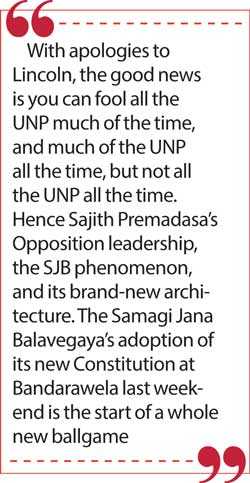
In this context comes the broadside by Cambridge-educated Professor Emeritus G.H. (Gerald) Peiris, leading geographer and member of the Experts Committee headed by Romesh de Silva, PC, drafting the new Constitution.
In a series of articles in The Island, Prof. Gerry Peiris attacked the governing coalition for preparing to hold PC elections instead of abolishing the institution itself. In his Preamble, Prof. Peiris writes pointedly as follows:
“This article is prompted by the recent announcement that the Cabinet will soon consider a proposal to conduct Provincial Council (PC) elections without delay. The article is intended to urge that the PC system should be abolished…The article is also intended to stimulate the memory of those who appear to have forgotten the circumstances that culminated in the enactment of legislation in 1987 to establish PCs.
There appears to prevail a measure of complacency among some of our present political stalwarts based on the notion that, with their two-thirds majority in Parliament, and with the 20th Amendment in place, they ought to let the status quo remain intact.
This, I think, is quite silly. Apart from the fact that landslide electoral victories tend often to be brittle, those who were in the forefront of empowering the present regime are already reacting with dismay to the decision to re-establish the PCs.” (Province-based Devolution in Sri Lanka: a Critique – The Island – https://island.lk/province-based-devolution-in-sri-lanka-a-critique/)
At the end of Part 2, Prof Peiris concludes his essay by clearly reiterating his objective, namely nothing other and nothing less than the abolition of the PC system:
“The antecedents of the PC system sketched above constitute only two sets of reasons that justify the appeal for its abolition.” (Province-based Devolution in Sri Lanka: a Critique – The Island) Not only does Prof Peiris’ series of articles show that he is hardly open-minded and unlikely to seek consensus about the content of the new Constitution, but he also thinks it ‘silly’ to hold elections to the existing Provincial Councils under the existing Constitutional provisions until a new Constitution comes along, whenever that may be.
Those “political stalwarts” with their “two-thirds majority” and their “silly” thinking, doubtless wish to revive a dormant institution which may afford them an expanded electoral power-base while giving the Government’s Tamil and Muslim allies some representation in the North and East which provides an economic-developmental shareholding and enhanced political legitimacy. It would also help the equation with India.
In effect, what the “political stalwarts” seek has nothing whatsoever to do with the new Constitution and in no way impedes it. Why then does a member of the drafting committee of the new Constitution take time off from that task, step outside the usual norms, and attack an initiative of the PM, Asia’s most experienced politician (now that Mahathir Mohamed has stepped down)?
The answer can only be that the central task of the new Constitution project as understood by Prof GH Peiris (an indisputably learned man) is to “abolish” not merely the 13th Amendment but also “the PC system” (his words) and that holding elections to the PCs before that, may somehow delay, dilute, or deflect that project.
Accord or Adani?
Having just appointed a ‘Sinhala Only’ board (no Tamils or Muslims) chaired by a former Minister, for the Human Rights Commission of Sri Lanka, thereby ensuring its international downgrading and further depleting domestic justice mechanisms of legitimacy, will President Gotabaya Rajapaksa instruct the new Constitution to be produced at “warp speed” to pre-empt his brother the PM’s pragmatic effort to hold elections to the PCs?
What will be the fate of the Tamil and Muslim allies of the Government? Already, given what has happened and is happening-- the ‘burning questions’ of the day, so to speak-- they may have begun to be viewed by their educated youth in much the same way that Malcolm X depicted the collaborationist old elite of the black community in his legendary “We Sick, Massa?” speech. (Malcolm X: The House Negro and the Field Negro Speech – YouTube – https://www.youtube.com/watch?v=fwgJewsy2BI)
How will India and the world community as a whole respond to the abolition of the PC system which grants a measure of provincial semi-autonomy to the Tamils? It is exceedingly unlikely that against the backdrop of the peasant agitation in India, not to mention the competition with China, Prime Minister Modi would leave open space for his opponents to charge that the Tamils of Sri Lanka and the strategic achievement of Rajiv Gandhi and a Congress government were traded back to China’s ally President Gotabaya Rajapaksa, in exchange for gains by the Adani Group.
Furthermore, how would world opinion view India if a hawkish Sinhala-Buddhist militarist regime unimpeded by India, stripped the Sri Lanka’s Tamils (who have more soft power globally than do the Kashmiris) of their provincial semi-autonomy earlier obtained for them by India?
How would political elites and legislators in the USA and the Quad as a whole, view India’s capacity to manage China within the South Asian subsystem, traditionally India’s sphere of influence? India’s action/inaction could tilt the balance between appeasement and contention/containment.
The breakup of Yugoslavia commenced with the abolition of the autonomous status of the province of Kosovo by the Serb-dominated national legislature under the leadership of President Slobodan Milosevic, a former socialist turned nationalist, persuaded by ultranationalist Serbian politicians and civil society elements to undo the federal structure carefully put in place by the iconic Marshal Tito, an independent-minded Communist and a founder of the Nonaligned Movement. The process that began with the abolition of Kosovo’s provincial autonomy ended with the disappearance of Yugoslavia as a country and the emergence of several former-Yugoslav areas regions and the province of Kosovo as independent states.
Death of the Opposition
In January 2019, the UNP was celebrating the overthrow of Mahinda Rajapaksa as PM. In January 2020 Mahinda Rajapaksa was the PM. From 2015 to end-2018, the most numerous Opposition formation was denied recognition as the parliamentary Opposition. In 2020 it solidly controls Legislative and Executive power.
In January 2019 the UNP and TNA celebrated the successful avoidance of a Parliamentary Election. In 2020 the UNP which could have registered a respectable total of seats while going into Opposition, wound up without a single seat in Parliament while the TNA’s haul of seats was considerably diminished.
In January 2019 the UNP and TNA were hellbent on abolishing the presidential system. In 2020 the presidential system emerged as strong as it ever was and arguably stronger than ever before.
In January 2019 para-UNP neoliberal civil society was celebrating the overthrow of a fake constitutional coup. Having cried ‘wolf!’ in late-2018, civil society was subjected in 2020 to an approximation of an actual constitutional coup, with a massively reinforced Presidency creating a broad swathe of ex-military brass and militarised Task Forces where the civilian state administration used to be.
In 2019 the UNP and TNA sought a new Constitution which would abolish the unitary character of the state. The country faces the prospect of a new Constitution in 2021 which abolishes Provincial Councils.
Looking back at the UNP over a quarter-century, one may paraphrase Churchill and conclude that never in the history of this island’s politics has so much been got so wrong, for so long, by so few.
How could this have been possible? A clue lies in a repeated assertion, on-camera, and post-electoral extinction, by a key ideologue and former power-wielder of the deposed UNP Establishment, that Sir John Kotelawala (1953-1956) was one of this country’s most successful Prime Ministers and Ranil Wickremesinghe was the best leader Sri Lanka never had.
This indicates just how far the mindset of the UNP Establishment and its ideologues had cut its moorings to reality.
The modernist consensus (which I subscribe to) holds that the policy of Sinhala Only adopted by S.W.R.D. Bandaranaike—not SWRD’s 1956 victory itself—was the ‘Original Sin’, the start of Sri Lanka’s fall from grace, the beginning of the end of its Golden Age.
Without Sir John Kotelawala and his administration’s ethos, there would have been no ‘Sinhala Only’ backlash.
Despite the unarmed Hartal (mass uprising) of August 1953, the UNP failed to course-correct, just as it failed to do after the crushing defeat at the 2018 Local Government elections.
In a foretaste of 2015-2019, Sir John Kotelawala (Dudley Senanayake’s successor) was given to social gestures, practices and arrogant pronouncements that were an affront to the sensibility of the Sinhala-Buddhist majority.
Hence SWRD was tempted into playing the Sinhala Only card, just as the Rajapaksa-led Joint Opposition/SLPP was tempted to play the GR candidacy card.
If Ranil Wickremesinghe or even Karu Jayasuriya (uncharacteristically biased, immoderate, intemperate and manipulable as Speaker in 2015-2019) had been the UNP’s presidential candidate in November 2019, GR would have hit his expected 60% mark which only a Bandaranaike—CBK—had ever obtained.
Sajith Premadasa stopped it, holding the line at a respectable 42% at the worst of times for the UNP, and limiting GR to 52% at the best of times for him.
Sir John Kotelawala and his UNP were to the rise and triumph of ‘Sinhala Only’ in 1956, what Ranil Wickremesinghe and his UNP were to the rise and triumph of the Gotabaya ultranationalist backlash of 2019-2020: the most ethnically polarising and electorally calamitous Prime Ministers the UNP ever produced.
Beyond the political decimation, the utter moral-ethical bankruptcy of the UNP is best evidenced by the fact that Ranil Wickremesinghe remains the Party Leader, while the sleepwalking survivors don’t have the sanity to replace him with Ruwan Wijewardene and nominate the latter for the National List seat.
Rebirth of the Opposition
With apologies to Lincoln, the good news is you can fool all the UNP much of the time, and much of the UNP all the time, but not all the UNP all the time. Hence Sajith Premadasa’s Opposition leadership, the SJB phenomenon, and its brand-new architecture.
The Samagi Jana Balavegaya’s adoption of its new Constitution at Bandarawela last weekend is the start of a whole new ballgame.
‘Goals, Policies and Basic Principles’ (Chapter 2) include ‘freedom’, ‘democracy’ ‘social justice’, ‘modern’, ‘progressive’ and ‘unitary’ among others.
The new Constitution returns to the roots, the founding 1946 UNP Constitution of D.S. Senanayake, combining it with features such as incorporating the elected Provincial Council and Pradesheeya Sabha members in the decision-making bodies as proposed by Sajith Premadasa during his reformist rebellion ten years ago.
It ruptures with the UNP Constitution of 1995 which enthroned Wickremesinghe, created a penthouse for a party leader socially distanced and insulated from the influences and feedback of the popular base, thereby ensuring that the UNP could never win the presidency and lead the country again.
The SJB’s new Constitution opens the party to the flow of ideas and feedback from the elected representatives at all three levels of the political system, as well as from the party’s mass organisations.
Adopting through protracted consultation with all its elected representatives, by far the least despotic and most transparently participatory-democratic Constitution of any political party in Sri Lanka, the UNP’s successor formation has just become structurally electable--the UNP having failed for over three decades to contribute a leader for the country.
The renovated party has as its founder-leader, the most viable contender for the country’s top-spot: relatively youthful, perfectly bilingual, combining chemistry and resonance with people at the grassroots, with a British public school education and a patriotic-populist brand-name that can compete with the ruling clan.